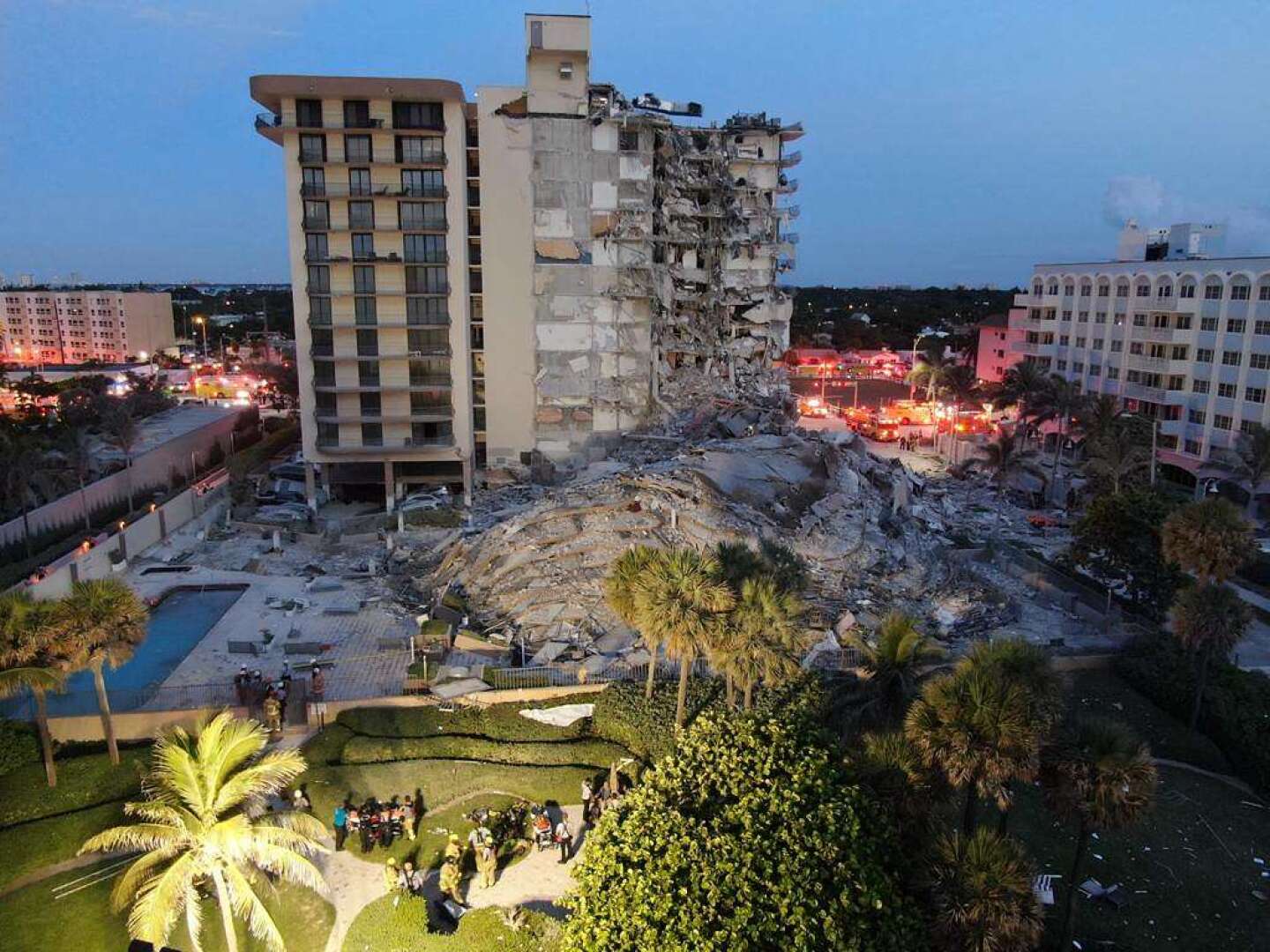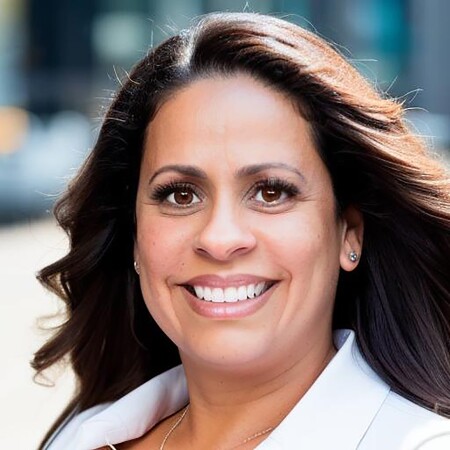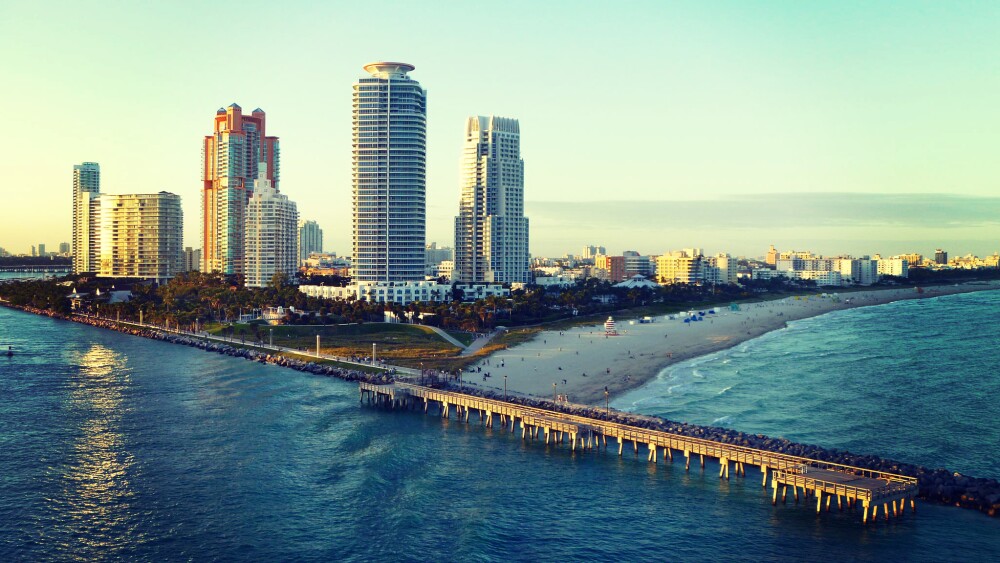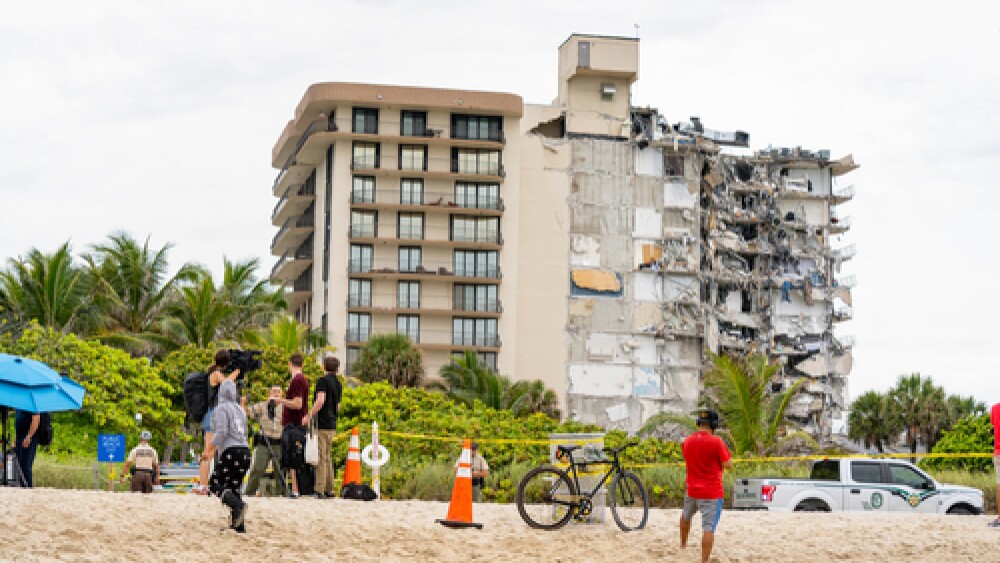
New regulations in Forida are coming due that make condo ownership more expensive. With the goal of preventing another tragedy like the partial collapse of the Champlain Tower South condo building in Surfside, which killed 98 people, Florida legislators passed new structural safety regulations in 2022 and 2023, with a looming deadline of Dec. 31, 2024, for condo associations to comply.
creative commons
A one-two punch is hitting condo owners and associations in Florida, forcing some to sell to cash buyers at massive discounts or risk foreclosure. The setback could have national implications.
The first hit: new regulations are coming due that make condo ownership more expensive. With the goal of preventing another tragedy like the partial collapse of the Champlain Towers South condo building in Surfside, which killed 98 people, Florida legislators passed new structural safety regulations in 2022 and 2023. Condo associations face a looming deadline of December 31, 2024, to comply.
The laws—Senate Bill 4-D and Senate Bill 154—mandate milestone inspections for condo and co-op buildings that are three stories or taller once they turn 25 or 30 years old, depending on how close a structure is to the coastline. These laws also require all associations to complete structural integrity reserve studies every decade and fully fund those reserves, among other new mandatory reserve rules.
Special assessment fees
Special assessment fees to catch up with deferred maintenance can total more than $100,000 per unit owner and are being layered atop monthly fees that are also escalating rapidly. Unit owners at Mediterranean Village in northeastern Miami-Dade County are facing special assessments as high as $400,000.
Some condo owners, doubly saddled with the cost of skyrocketing insurance rates—which rose by 102 percent during the last three years, according to the Insurance Information Institute—are hitting the “sell” button.
Those who do sell are finding that non-compliance with post-Surfside laws can cause insurers to drop their insurance coverage altogether and that their buyers can’t acquire mortgages. This outcome is forcing some owners to sell for cash and drop prices so low, in some cases, that “the unit is actually worth less than the back taxes and the special assessments,” according to Raul Gastesi, town attorney of Miami Lakes, a master-planned community of 30,000.
Condo prices in Florida are down about 12 percent since the peak of demand in 2022, whereas single-family home prices haven’t changed much. “The sale prices of these condos just jumped off a cliff,” Gastesi says. “And it’s going to get worse.”
Florida impacts: ‘Tip of the iceberg’
Unfortunately for condo owners, special assessments to catch up on delayed repairs and maintenance accumulate on top of skyrocketing homeowners insurance premiums, which have doubled for some condo complexes.
“The cost of insurance is already prohibitive,” says Ermengarde Jabir, senior economist at Moody’s. Insurers are pricing in the risk of increasingly frequent storms and other severe weather events caused by climate change. Rising insurance premiums are exacerbating housing affordability, both in higher-risk areas like coastal Florida and nationally, thanks to insurance bundling.
“There are areas where the homes people own are now unaffordable simply because of the insurance,” says Janet Bozeman, a real estate attorney with Williams Teusink, LLC, and a ULI member based in Atlanta.

According to Désirée Ávila, a realtor in South Florida, insurers drop coverage on buildings found to have structural issues or necessary repairs that weren’t made in time. If associations don’t show proof they completed the necessary studies to show their buildings’ structural integrity, they risk being dropped.
Désirée Ávila
In post-Surfside Florida, some condominium buildings are uninsurable at any price. According to Désirée Ávila, a realtor in South Florida, insurers drop coverage on buildings found to have structural issues or necessary repairs that weren’t made in time. If associations don’t show proof that they completed the studies necessary to show their buildings’ structural integrity, they risk being dropped.
Banks, layering on more complications, refuse to issue mortgages or other loans for buildings that lack the right kind of insurance. In fact, when making loans to condominium buyers, banks take into account both insurance and whatever reserves boards have accumulated.
“A bank won’t touch [a deal] if the reserves are not funded,” says Ávila, who calls the visible market impacts of the new regulations the “tip of the iceberg.” She says a domino effect of insurance and mortgage denials may follow, leaving owners who can’t afford their special assessments and insurance premiums with only one option: to sell to an all-cash buyer who does not need to secure a mortgage.
“Now the building is known as an all-cash building,” says Gastesi. “This [status] severely limits the pool of eligible and willing buyers, and the prices of units have crashed.”
A tale of two condo associations
Before Surfside, condo associations in Florida could elect to waive reserve requirements and defer maintenance, and often did so. Many unit owners pressured associations to keep monthly fees just high enough to cover the day-to-day expenses of running the property. Boards that tried to implement special assessments to pay for big-ticket repairs often got ousted.
“A lot of condos are in this situation because of mismanaged funds but also because association members [chose], in some cases for years or decades, to forgo funding reserves,” Avila says. “They kept putting things off, and now it is time to pay the piper all at once.”
A lot of owners did not appreciate how much they really needed to set aside for the maintenance and repair of their aging buildings, Bozeman says. “They thought fees just support the pool or the tennis court, [as if] it’s this optional thing.”
Now, according to Gastesi, “the government is making everybody make up for lost time,” and it’s an especially bitter pill for new owners. Under the new regulations, a condo owner who bought in 2022 can get stuck with the bill “for assessments and repairs that were deferred by the past three, four, five, eight owners,” Gastesi says.
With older buildings for which the extent of necessary repairs and the price tag has not yet been determined, the uncertainty itself weighs down unit prices. “We don’t know what we don’t know yet,” Ávila says. “We’re in the storm of change. Until we get to the other side, we don’t know what’s going to happen. In the long run, it will sort itself out. But how long is it going to take? Five years? Ten years?”
In the meantime, those who lack the means to pay special assessment fees may end up with their units foreclosed upon, or even condemned.
Whereas in past years, building inspectors faced pressure from elected officials to enforce rules loosely, the pendulum has swung the other way, with the death of Surfside’s victims at top of mind for everyone. “A lot of times [inspectors] were getting pressure from elected officials not to close down buildings because there was going to be an uproar,” Gastesi says. “That’s all changed. [Inspectors] are responding to pressure from public officials by cracking down.”
Of course, not every condominium unit owner in Florida is hit equally hard by the legislation. Many condo community associations—especially of newer and pricier buildings—choose to fund financial reserves fully rather than to waive those costs. Thus, they proactively ensure their buildings stay repaired and maintained.
“It’s a tale of two condo associations,” Gastesi says. “The wealthier buildings keep up with their dues, fund their reserves, and tend to hire reputable building management companies, while condo associations in buildings where most owners are lower income and fixed income are more vulnerable to fraudulent business management companies and tend to defer payments.”
Condo values could also shift to reflect this stark contrast. “We expect [that] older buildings may face a temporary hit in value as they gear up to meet the new regulations,” says Joseph Ahmadi, a principal at Lessard Design, an architecture and planning firm in Vienna, Virginia. “On the flip side, newer buildings that already comply could [have] their value soar as buyers increasingly prioritize safety and compliance.”

Special assessment fees to catch up with deferred maintenance can equal upwards of $100,000 per unit owner and are being layered on top of monthly fees that are also escalating rapidly. Unit owners at Mediterranean Village in northeastern Miami-Dade County are facing special assessments as high as $400,000.
creative commons
The potential for national impacts
Fannie Mae and Freddie Mac, the government-sponsored entities, have also made big moves in reaction to Surfside with regard to how they treat condo loans for properties with five or more units. The new rules, which are already in effect, mandate a review of a property’s repair status before mortgage approval.
Too much deferred maintenance or too many construction defects can land a condo community on the agency’s “blacklist,” meaning it is out of compliance with conventional lending rules, making securing a Fannie Mae- or Freddie Mac-backed loan that much harder.
In addition to Fannie and Freddie’s rule changes, local and state governments throughout the United States, especially in coastal areas, are beefing up building codes in response to various weather events and disasters, not just the Surfside tragedy itself.
“I have seen a [movement] for more states to require reserve studies, and they are a little bit more proactive about making it a requirement instead of making it optional,” Bozeman says. “That way, people [being] aware of what needs to be done [is] not unique to Florida. Although states have gotten more stringent in their building codes, the problem of underfunding [reserves] is not new.”
Florida is “the guinea pig for these changes,” which other state and local governments are likely to study, Ávila says. But the legislative reaction to Surfside has not been geographically uniform.
New Jersey passed legislation in January 2024 that require reserve studies and structural expertise. Tennessee reacted to Surfside with an amendment to its title code that requires associations to conduct reserve studies, but their frequency is not as strictly defined as it is in Florida. Maryland did likewise via House Bill 107, which also included provisions related to structural safety.
Other legislatures, however, consider their existing regulations adequate. “The rules and regulations in New York City [around] structural integrity are more stringent than [in] Florida and have been for years,” says Christopher Alker, senior vice president of building operations with AKAM, a property management company specializing in condominiums. “In fact, the law regarding inspections of faꞔades in New York City [has been] in place since 1980. The Construction Codes Revision Bill covering parking structures was enacted in November of 2021 but had been in the works for some time.”
Currently, no legal requirement exists in New York state for condos or co-ops to maintain a minimum reserve fund amount or collect reserves annually within an operating budget, Alker notes.
Other municipal governments are likely to look to their Florida counterparts and learn from them. “A county somewhere in North Carolina might say, ‘let’s go down to Broward [County] and see what they did, to determine if it will work for us,’” Ávila says.
Rethinking the Surfside collapse
Coastal living is undeniably appealing. People flock to Florida—especially South Florida—for the lifestyle. Over the decades, municipal governments, urban planners, developers, architects, builders, and engineers have responded to meet this demand and put up giant buildings as close to the water as possible.
Before Surfside, though, regulations didn’t account for the tendency to kick the can down the road—human nature when money is tight. Instead, rules mandated “voluntary contributions rather than obligations to offset the ravages of time and nature” and were not adequate, said Robert Nordlund—founder and CEO of Association Reserves, a consultancy—during a recent podcast.
Underqualified board members added to the impact of this up-for-interpretation regulatory environment. “Board members do their best, but they are not captains of industry,” Nordlund said on the podcast. “Often the task of being a board member is undersold to them as a responsibility of one night a month, but they end up running a multimillion-dollar corporation.”
According to Moody’s Jabir, cases arose with causes more sinister than a simple lack of qualifications. Some condo owners thought they were paying for structural assessments and repairs—only to learn they were swindled. Recent state laws have been passed in an attempt to address this issue, though some experts say they fall short.
“Up and down Miami Beach ... it was not a lack of funds for repairs,” Jabir says. “It was really poor administration by condo boards of those funds—money in the millions disappearing.” In December 2023, for example, unit owners at the Star Lakes 55-and-older complex near North Miami Beach won a lawsuit and ousted their board after years of allegations that ownvers were charged $3 million in special assessments without any repairs being made.
“The management company is the key to all of this,” Gastesi says. He cited cases wherein shady third-party management companies preyed on lower or fixed-income condo owners—often exploiting language barriers. The repair work was then contracted to friends at inflated prices for kickbacks. In some cases, repairs were paid for but never made.
Winners and losers
In Florida, the condo owners most affected by the changes are retirees on fixed incomes or people with low incomes who don’t have the money to pay for increasing insurance premiums, reserve requirements, and special assessments. These owners will have to sell to their own detriment—and to the benefit of opportunistic investors, developers, builders, and converters.
“We’re going to see a lot of cash investors swooping in and scooping up these places,” Ávila says. Developers are already making cash offers on prime coastal properties in hopes of redeveloping them. Continuum Company recently sent offer letters to each owner at the Four Winds—an oceanfront condo building just blocks away from the Champlain Towers tragedy—after the building’s board rejected an offer to buy it outright.
Given the vulnerable demographic group most affected by the new regulations, some owners are hoping the government will step in and bring some relief. “Hopefully, somebody will put together some sort of legislation to help bail out … low-income and fixed-income condo owners,” Ávila says. “Something so that they’re not left homeless.”
Others say that although painful in the short term, in the long term, Surfside’s regulatory repercussions will create a healthier market for condominiums as a housing type, with which adequate funding for routine maintenance minimizes the need for special assessments and borrowing.
“When we consider the implications of Florida’s new condo inspection law, it’s evident that this legislation is likely to influence other states over time, both in the short and long term,” says Lessard Design’s Ahmadi. “Like with any new law, there will be an adjustment period. In the long term, these regulations are set to pave the way for enhanced safety and maintenance practices, ensuring a more secure and resilient condo market landscape across the nation.”
Further reading:
ULI’s Surge: Coastal Resilience and Real Estate introduces the challenges associated with coastal hazards such as sea level rise, coastal storms, flooding, erosion, and subsidence, and provides best practices for real estate and land use professionals, as well as public officials, to address them.
The ULI Developing Resilience Toolkit: a compilation of over 140 strategies to help owners prepare their buildings for floods, fires, storms, heat, and more. It’s a filterable tool teams can use to quickly identify strategies, assess their applications and considerations, and have informed conversations with internal stakeholders and external consultants when developing a resilience strategy. It also shares a resilient design process to help teams determine how to approach their climate resilience strategy overall.







